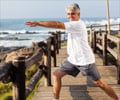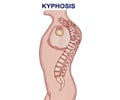World Osteoporosis Day which falls on October 20th, 2010 provides a powerful opportunity to create awareness about the importance of bone health and measures to prevent osteoporosis.

Spinal, or vertebral, fractures which mostly go undiagnosed or untreated happen to be the most common type of fragility fracture. One needs to be extremely cautious and take note of three important signs of vertebral fractures which are - height loss, back pain, and a stoop. Further, timely diagnosis is crucial to prevent a cascade of fractures.
‘Bone’ Voyage
Osteoporosis is a chronic condition of the bones caused by a gradual loss of bone density. Loss of vital minerals, especially calcium from the bones causes them to become porous, fragile and brittle. This makes the bones vulnerable to fractures, especially at the wrist, spine and hip. The disease is more pronounced in both men and women as they age.
Bone loss creeps in silently, gradually and painlessly; there are no tell tale symptoms of advancing osteoporosis, also called a ‘silent disease’. Many patients are diagnosed with the condition after they suffer a fracture. This makes it important to create sufficient awareness of the disease in order to take necessary preventive steps.
Bone up on Facts
Adults have about 206 rigid bones in their bodies. The bones are made up of calcium, phosphorous, sodium and other minerals, vitamins and the protein, collagen. Calcium is stored in the bones and is released to the other body parts according to the need. As children grow, bones become strong due to accumulation of bone mass. This process takes place till about 30 years of age.
Nearly 71% of the osteoporosis fractures occur in women. Genetically, women are born with a bone mass less than that of men. After menopause, the loss of bone mass is accentuated, caused by a reduction in the estrogen level. That is why osteoporosis is more common in women than men. Notwithstanding, nearly one in 3 women and one in 5 men over the age of 50 are grappling with the effects of bone loss.
More than 26 million people in India alone are battling osteoporosis; these numbers are expected to go up to 36 million by 2013. Further, as per forecasts, Asia will account for more than 50% of hip fractures in the world by 2050. An estimated 44 million people in the United States suffer the condition.
Worse, almost 24% of patients above 50 years of age who suffer a hip fracture do not live beyond a year.
• Smoking and alcohol adversely affects the bones.
• Sedentary lifestyle increases the risk of osteoporosis.
• Type I diabetes, rheumatoid arthritis, hyper thyroidism, and inadequate estrogen increases the risk of osteoporosis.
Diagnosis
Experts conduct a medical examination, comprising a thorough physical examination, followed by detailed X rays of the skeletal system. A bone densitometry test which is a bone density scan is the final word in detecting the condition.
Treatment of Osteoporosis
The treatment is multi-pronged involving a combination of diet, exercise and medication.
• Diet is spruced up to include more protein and vitamins.
• Calcium and vitamin D supplements are advised.
• Post menopausal women are advised estrogen replacement therapy.
• Weight bearing exercise is recommended on a regular basis.
Prevention of Osteoporosis
Did you know that most of the bone mass is built up before 30 years of age?
Food rich in calcium and Vitamin D along with regular weight bearing exercise in the formative years, especially during the adolescent years can prevent osteoporosis.
Further, maintaining bone mass after one has crossed 30 years of age is crucial to arrest the onset of osteoporosis.
• Consumption of Vitamin D and Calcium is important to reduce the loss of bone mass.
• Lifestyle modification -cutting down alcohol and smoking and indulging in physical exercise - walking, jogging, and aerobic exercises can prevent osteoporosis.
• Recommended Daily Allowance of Calcium for:
• Adolescent boy and girl – 1300 mg of calcium
• Ages19-50 – 1000 mg per day
• Above 50 (men and women) – 1200 mg
Getting Close to the Bone – Risks
• Heredity and genes have a significant role in the development of osteoporosis.
• Women who have undergone hysterectomy, or who have reached premature menopause carry the risk of osteoporosis.
• Improper diet during the growing up years especially if calcium intake has been insufficient below the recommended daily allowance, then the risk is pronounced.
The saving grace comes in the form of good nutrition during the growing up years, which can mitigate the extent of bone loss in the later years. The importance of exercise and lifestyle in allaying this debilitating condition of osteoporosis cannot be overemphasized.
Source-Medindia














